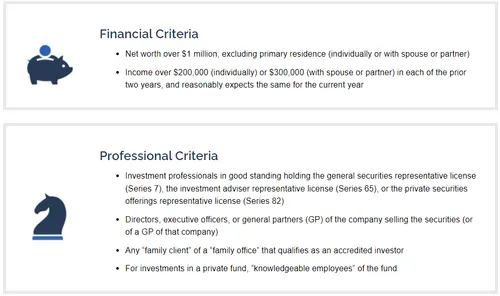Our partner, XM, lets you access a free demo account to apply your knowledge.
No hidden costs, no tricks.

The global capital markets are easily accessible to millions of investors who can open a brokerage account and gain access to thousands of instruments from a variety of markets, such as forex, stocks, commodities, crypto, etc.
However, certain investment products carry considerable risk and are characterized by low liquidity, which makes it difficult for investors to exit their positions at will. This makes it important for financial markets to have certain thresholds to offer such products to well-established and experienced investors.
For this reason, the concept of an accredited investor exists. Accredited investors are market participants with years of experience and enough liquid assets to their name to allow them to make risky investments without compromising their financial stability.
Accredited investors have access to off-market deals and private equity investments, which are generally not accessible to retail investors.
If you are a beginner investor and would like to know more about what an accredited status is and how it works, this Investfox guide is for you.

Accredited status typically refers to a designation given to investors who meet certain financial criteria and are deemed to have sufficient financial sophistication to participate in certain types of investments that are considered higher risk or more complex, such as venture capital and startups.
In the United States, the concept of accredited investors is primarily defined by the Securities and Exchange Commission (SEC).
For a person to qualify as an accredited investor, the must meet at least one of the following criteria:
Investors that qualify for the accredited status have access to a wide variety of private market deals that are otherwise not accessible to a majority of the investor base.
The assumption behind the accredited investor status is that a person with a substantial income level and net worth has the necessary financial qualifications and resources to be liable for such non-liquid investments.
However, it must be noted that for private equity investments, accredited investors are often barred from investing more than 10% of their liquid annual income in a particular investment to avoid overexposure and putting their financial stability at risk.
Obtaining an accredited status comes with a few key perks for investors that allow them to access deals and investments that are otherwise not available to retail investors.
Some important implications of the accredited status include:
Our partner, XM, lets you access a free demo account to apply your knowledge.
No hidden costs, no tricks.
In order for an investor to become accredited, they must comply with one of the following criteria:
Becoming an accredited investor provides access to exclusive investment opportunities, such as private placements and hedge funds. It reflects financial sophistication, allowing participation in higher-risk, potentially higher-reward ventures not available to non-accredited investors in the United States.
In the United States, an accredited investor is an individual or entity meeting specific financial criteria, allowing participation in certain private securities offerings. Qualifications include high income or net worth, aiming to ensure investors have sufficient financial sophistication and risk tolerance.